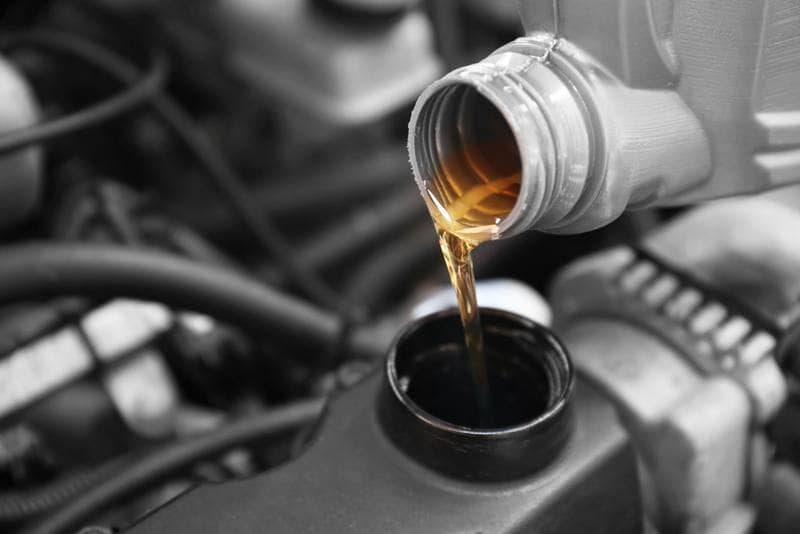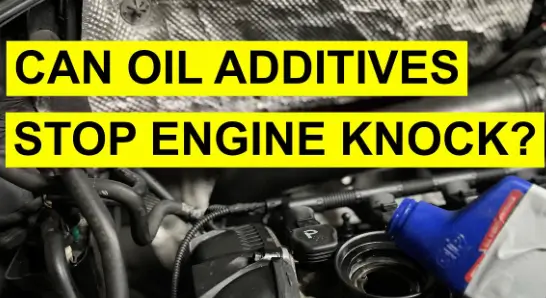Adding oil may temporarily reduce engine knock, but it is not a guaranteed fix. Engine knock is typically caused by other factors such as incorrect fuel octane rating, carbon build-up, or faulty engine components.
It is essential to address the root cause of the problem to prevent further damage to the engine.
Understanding Engine Knock And Its Causes
Engine knock can have multiple causes, and while adding oil may help in some instances, it may not always be the solution. Factors such as incorrect fuel octane rating or faulty spark plugs can also contribute to engine knock. It’s important to understand the underlying causes to address the issue effectively.
Engine knock is a common problem faced by many vehicle owners, and it can be quite concerning. If you’re experiencing engine knock, you’re probably wondering what causes it and whether adding oil can help alleviate the issue.
Definition of engine knock
Engine knock, also known as detonation, refers to the knocking or pinging sound that occurs within the engine combustion chamber. It happens when the air-fuel mixture ignites unevenly or prematurely, causing a mini-explosion before the regular combustion process. This can be caused by various factors, including incorrect timing, poor fuel quality, and excessive combustion chamber temperature.
Common causes of engine knock (H3)
1. Incorrect ignition timing: When the spark plug fires too early or too late in the engine’s combustion cycle, it can result in engine knock. This is often seen in older vehicles with carburetors or those with faulty ignition systems.
2. Poor fuel quality: Low-quality or contaminated fuel can also contribute to engine knock. Fuel with a low octane rating can ignite prematurely, leading to detonation. Additionally, the presence of impurities in the fuel can cause irregular combustion.
3. Overheating: Engine knock can occur if the temperature inside the combustion chamber becomes excessively high. This can happen due to factors such as a malfunctioning cooling system, a stuck thermostat, or engine operating conditions that cause excessive stress.
4. Carbon deposits: Over time, carbon deposits can accumulate on the cylinder walls, spark plugs, and other combustion chamber components. This can lead to hot spots that trigger premature fuel ignition and engine knock.
Link between insufficient lubrication and engine knock
Insufficient lubrication can indeed contribute to engine knock. When engine components are not adequately lubricated, friction increases, leading to higher operating temperatures. As a result, the risk of engine knock also rises. The oil in the engine not only lubricates moving parts but also helps dissipate heat, thus playing a crucial role in preventing engine knock.
Regular oil changes should be conducted as recommended by the vehicle manufacturer to ensure adequate lubrication. Additionally, using the correct viscosity oil for your engine can help maintain optimal lubrication and reduce the likelihood of engine knock.
In conclusion, engine knock is a common issue that can occur due to incorrect timing, poor fuel quality, overheating, and carbon deposits. Insufficient lubrication can also contribute to engine knock.
Understanding the causes of engine knock can help you identify and resolve the issue effectively. Adding oil can be beneficial in preventing engine knock by ensuring proper lubrication and dissipating heat. However, it is important to address the underlying cause of engine knock to prevent further damage and maintain the overall health of your vehicle’s engine.

Credit: www.jimellishyundai.com
How Oil Plays A Crucial Role In Engine Performance
When it comes to the smooth running and longevity of your car’s engine, one of the key players behind the scenes is oil. Oil plays a critical role in engine performance and ensuring its proper function contributes to overall vehicle efficiency and power.
Understanding the purpose of oil in an engine, its role in reducing friction and heat, as well as the importance of viscosity and oil additives, can provide you with valuable insights into maintaining your engine’s health and performance.
Explaining The Purpose Of Oil In An Engine
The purpose of oil in an engine goes beyond mere lubrication. While its primary role is to lubricate the engine’s moving parts, such as the pistons, crankshaft, and camshaft, it also serves other important functions.
Oil helps to clean the engine by collecting dirt, debris, and combustion byproducts, preventing them from accumulating and causing damage. Additionally, it helps to form a protective barrier on metal surfaces, reducing wear and tear, and preventing corrosion. This ensures that the engine operates smoothly and efficiently, making oil a crucial element in engine performance.
Role Of Oil In Reducing Friction And Heat
Friction and heat can be detrimental to an engine’s performance and longevity. High temperatures can cause engine parts to expand excessively, leading to increased wear and reduced efficiency.
Oil acts as both a lubricant and a coolant, reducing friction between moving parts and dissipating heat generated during combustion. By minimizing friction and maintaining optimal temperatures, oil plays a vital role in safeguarding engine components from excessive wear and preventing overheating-related issues.
Importance Of Viscosity And Oil Additives
Viscosity refers to the oil’s resistance to flow and is crucial for proper engine lubrication and protection. Different engines require different oil viscosities, as specified by the manufacturer.
Choosing the appropriate viscosity ensures adequate lubrication under various operating conditions, from cold starts to high-temperature operations. Furthermore, oil additives enhance the performance of lubricants by providing additional protective properties.
These additives can improve the oil’s ability to resist oxidation, prevent sludge formation, and enhance its detergent and dispersant capacities. Thus, selecting oil with the right viscosity and utilizing oil additives tailored to your engine’s requirements is essential for optimal engine performance.
In conclusion, oil plays a multifaceted role in engine performance, extending beyond basic lubrication. Understanding its purpose, role in reducing friction and heat, as well as the importance of viscosity and oil additives, empowers car owners to make informed decisions regarding oil selection and maintenance.
By ensuring your engine is equipped with the right oil and maintaining regular oil changes, you can promote engine longevity, improve fuel efficiency, and enjoy a smoother, more reliable driving experience.
Signs And Symptoms Of Engine Knock
Engine knock, also known as detonation, is a common problem that many car owners encounter. This knocking sound can be quite alarming, but it’s important to understand the signs and symptoms associated with engine knock to identify and address the issue promptly.
By recognizing these indicators, you can prevent potential damages to your engine and ensure its optimal performance. Let’s delve into the audible signals of engine knock, observing performance issues and warning lights, as well as the potential damages caused by prolonged engine knock.
Audible Signals Of Engine Knock
One of the primary ways to identify engine knock is through its audible signals. When your vehicle’s engine experiences detonation, you may notice a distinct knocking or pinging sound coming from under the hood. This noise is often described as metallic, resembling the sound of marbles rattling around in a tin can.
In some cases, the knocking sound might be more pronounced during acceleration or under heavy load. It’s crucial to note that engine knock can vary in intensity, ranging from a faint ticking noise to a louder, more persistent knock. If you hear any unusual sounds that resemble engine knock, it’s imperative to address the issue promptly to prevent any further damage.
Observing Performance Issues And Warning Lights
In addition to the audible signals, engine knock is often accompanied by various performance issues. These issues can manifest in the form of reduced power and acceleration, poor fuel efficiency, and overall sluggishness in your vehicle’s performance. You might notice hesitation or a lack of responsiveness when pressing the gas pedal.
As engine knock can disrupt the combustion process within your engine cylinders, it may trigger the activation of warning lights on your dashboard.
These warning lights could include the check engine light, which serves as an indicator that something is amiss with your vehicle’s engine. When you experience engine knock, it’s crucial not to ignore these warning signs and seek professional assistance to diagnose and resolve the underlying problem.
Potential Damages Caused By Prolonged Engine Knock
If left unchecked, prolonged engine knock can lead to significant damages to your vehicle’s engine. The repeated knocking sound indicates uncontrolled explosions happening within the cylinders, subjecting the piston, valves, and other engine components to excessive stress and heat. Over time, this can result in a range of issues, including:
- Worn piston rings and cylinder walls
- Bent or damaged connecting rods
- Cracked or damaged cylinder head
- Increased likelihood of engine overheating
- Damage to the engine bearings
- Reduced engine lifespan
These potential damages can not only be costly to repair but may also necessitate the complete replacement of certain engine components. To avoid these issues and ensure the longevity of your engine, it’s crucial to address engine knock as soon as you become aware of its presence.
The Benefits Of Using High-quality Engine Oil
Choosing the right engine oil is crucial to the performance and longevity of your vehicle. Using high-quality engine oil offers numerous benefits that can help you maintain a smooth-running engine and prevent common issues like engine knock. In this article, we will explore the importance of selecting the right engine oil, compare synthetic and conventional oil, and highlight how using high-quality oil can prevent engine knock.
Importance Of Choosing The Right Engine Oil
Selecting the right engine oil is not just about pouring any oil into your engine. It requires careful consideration based on various factors, including your vehicle’s make and model, climate, and driving conditions.
The viscosity and additives in the oil play a significant role in protecting your engine against wear, reducing friction, and maintaining optimal performance.
When choosing engine oil, it is essential to refer to the manufacturer’s recommendations to ensure compatibility and performance.
Using the wrong oil viscosity or one that lacks the necessary additives can lead to increased engine wear and reduced fuel efficiency. Therefore, selecting the right oil is a crucial step in preventative maintenance and can go a long way in preventing engine knock.
Synthetic Vs. Conventional Oil: Pros And Cons
When it comes to choosing the right engine oil, you will likely encounter two primary options: synthetic oil and conventional oil. Each type has its own set of advantages and disadvantages.
| Pros | Cons |
|---|---|
| Synthetic Oil: | Conventional Oil: |
|
|
The decision between synthetic and conventional oil depends on factors such as budget, driving habits, and specific vehicle requirements. Synthetic oil, although more expensive, offers better protection and longevity, making it ideal for high-performance vehicles or those subjected to extreme temperatures.
How Using High-quality Oil Can Prevent Engine Knock
Engine knock, also known as knocking or pinging, is an undesirable phenomenon that occurs when the air/fuel mixture in the combustion chamber ignites abnormally. It can lead to reduced engine efficiency, power loss, and potential engine damage if left unaddressed. Using high-quality engine oil can help prevent engine knock in the following ways:
- Improved lubrication: High-quality oil contains advanced additives that provide superior lubrication, reducing friction between moving engine parts. This ensures smoother operation and reduces the chances of knocking.
- Enhanced heat dissipation: Engine knock often occurs due to excessive heat buildup in the combustion chamber. High-quality oil can effectively dissipate this heat, keeping the engine temperature within optimal limits and minimizing the risk of knocking.
- Reduced carbon deposits: Low-quality oil may leave behind carbon deposits on the engine components, contributing to knocking. High-quality oil, on the other hand, has better detergent properties that help prevent carbon buildup and maintain cleaner engine internals.
- Consistent viscosity: Engine knock can also result from oil that becomes too thin or too thick at high temperatures. High-quality oil tends to maintain a consistent viscosity across a wide range of temperatures, ensuring optimal lubrication and reducing the likelihood of knocking.
- Enhanced fuel efficiency: When your engine runs smoothly without knocking, it operates more efficiently, leading to improved fuel economy. High-quality oil, with its superior lubrication properties, helps maintain optimum fuel efficiency and prevents knocking-related performance issues.
By using high-quality engine oil and following the manufacturer’s recommendations for oil change intervals, you can significantly reduce the risk of engine knock and enjoy a more reliable and efficient driving experience.
Can Adding Oil Stop Engine Knock?
When it comes to engine knock, many car owners wonder if simply adding oil can solve the problem. Addressing this common misconception is crucial to understanding the temporary effect it may have. In this article, we will explore the question “Can Adding Oil Stop Engine Knock?” and shed light on the potential short-term benefits as well as the long-term solution to this issue.
Addressing The Common Misconception
The belief that adding oil can magically eliminate engine knock is a common misconception among car enthusiasts. While it is true that low oil levels can contribute to engine knocking, simply pouring more oil into the engine may provide only short-term relief, if any at all. Engine knock, also known as detonation, occurs when the air-fuel mixture in the combustion chamber detonates prematurely. This phenomenon can cause damage to the engine if not addressed properly.
The Temporary Effect Of Adding Oil On Engine Knock
Adding oil to an engine with low oil levels can temporarily reduce or eliminate engine knock. This is because oil helps lubricate the moving parts in the engine, reducing friction and heat, which can contribute to knocking.
Additionally, oil helps to absorb some of the energy generated during combustion, dampening the knocking sound. However, it should be noted that this is only a temporary solution and does not address the underlying cause of the engine knock.
It’s important to remember that engine knock can be caused by various factors such as incorrect ignition timing, low-quality fuel, carbon buildup, or faulty sensors.
Simply adding oil may mask the symptoms of engine knock, but it will not fix the root cause of the problem. Therefore, it is recommended to consult a professional mechanic to accurately diagnose and address the issue.
The Long-term Solution: Regular Maintenance And Oil Changes
While adding oil may provide temporary relief from engine knock, the most effective and long-term solution is to ensure regular maintenance and oil changes. Regular maintenance includes checking and replacing spark plugs, cleaning fuel injectors, and addressing any carbon buildup. Additionally, using high-quality fuel and addressing any issues with the engine’s sensors can help prevent engine knock.
Furthermore, ensuring regular oil changes is crucial for optimal engine performance. Fresh oil provides sufficient lubrication and cooling to the engine, reducing the likelihood of knocking. Consult your vehicle’s manufacturer guidelines for the recommended oil change intervals and opt for high-quality oil to maintain the engine’s health.
In conclusion, while adding oil may temporarily alleviate engine knock, it is not a long-term solution. To address this issue effectively, regular maintenance, including oil changes, is essential. By following these preventive measures, you can ensure the longevity and optimal performance of your engine, minimizing the risk of engine knock.
Frequently Asked Questions For Will Adding Oil Stop Engine Knock
Can Adding Oil Stop Engine Knock?
Adding oil can help reduce engine knock by lubricating the moving parts and reducing friction. However, it may not completely eliminate the knock. If the knock persists, it could indicate a more serious issue, and it’s recommended to consult a mechanic for a thorough diagnosis.
What Are The Common Causes Of Engine Knock?
Engine knock can be caused by a variety of factors, including low-quality fuel, carbon buildup in the combustion chamber, incorrect ignition timing, overheating, or worn-out engine components. Identifying the specific cause is crucial in order to effectively address the issue and prevent further damage to the engine.
How Does Engine Knock Affect The Performance Of A Vehicle?
Engine knock can negatively impact a vehicle’s performance in several ways. It can lead to reduced power output, poor fuel efficiency, and increased emissions. Additionally, prolonged engine knock can cause damage to the engine, leading to more severe and expensive repairs.
Is Engine Knock A Sign Of Impending Engine Failure?
Engine knock should never be ignored as it can be an early warning sign of potential engine failure. Ignoring engine knock can lead to increased wear and tear on engine components, which may eventually result in catastrophic engine failure. Promptly addressing engine knock can help prevent further damage and prolong the life of the engine.
Conclusion
To sum up, adding oil may help reduce engine knock by providing lubrication to the moving parts, reducing friction and heat. However, it is important to address the underlying causes of engine knock, such as using the correct oil grade, maintaining proper fuel quality, and regular engine maintenance.
Consulting with a qualified mechanic is crucial to accurately diagnose and resolve engine knock issues for optimal engine performance and longevity.


Leave a Reply